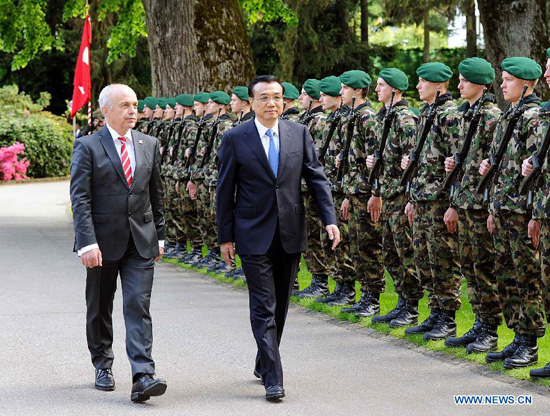李克強(qiáng)在瑞士《新蘇黎世報(bào)》發(fā)表署名文章(全文)
Full text: Li Keqiang's article published in Swiss newspaper
|
|
| 5月24日,國(guó)務(wù)院總理李克強(qiáng)在伯爾尼出席瑞士聯(lián)邦主席毛雷爾舉行的歡迎儀式。[新華社 李濤 攝] Chinese Premier Li Keqiang (C) attends a welcome ceremony held by Swiss President Ueli Maurer (L) in Bern, Switzerland, May 24, 2013. [Li Tao/Xinhua] |
|
關(guān)于中國(guó)發(fā)展的機(jī)遇,請(qǐng)?jiān)试S我簡(jiǎn)短羅列以下幾個(gè)具體事例:2012年中國(guó)的GDP按可比價(jià)算是2000年的3.2倍,翻了一番還多;到2020年通過(guò)努力在2010年的基礎(chǔ)上再翻一番,需年均增長(zhǎng)7%左右。今后五年,中國(guó)將進(jìn)口10萬(wàn)億美元左右的商品,對(duì)外投資規(guī)模將達(dá)到5000億美元。中國(guó)正在積極穩(wěn)妥地推進(jìn)城鎮(zhèn)化,數(shù)億農(nóng)民轉(zhuǎn)化為城鎮(zhèn)人口會(huì)釋放更大的市場(chǎng)需求。這些都表明,中國(guó)經(jīng)濟(jì)發(fā)展的前景十分廣闊,也會(huì)給包括瑞士在內(nèi)的各國(guó)發(fā)展帶來(lái)更多機(jī)遇。 關(guān)于中國(guó)政府的政策,我愿強(qiáng)調(diào):對(duì)內(nèi),我們?nèi)嫔罨袌?chǎng)化取向的改革,釋放改革的紅利,持續(xù)發(fā)展經(jīng)濟(jì),不斷改善民生,促進(jìn)社會(huì)公正,努力使人人享有平等的機(jī)會(huì)。對(duì)外,我們始終不渝走和平發(fā)展道路,奉行互利共贏的開(kāi)放戰(zhàn)略,擴(kuò)大對(duì)外開(kāi)放的領(lǐng)域和空間,特別是擴(kuò)大服務(wù)業(yè)對(duì)外開(kāi)放,以開(kāi)放促改革、促發(fā)展、促轉(zhuǎn)型。 如果有人還受到中瑞間一些差異和分歧的困擾,我想大可不必。中國(guó)正在致力于發(fā)展經(jīng)濟(jì)、保障人權(quán)、依法治國(guó)。由于歷史文化背景和發(fā)展階段的不同,中瑞間存在一些差異在所難免。但尺有所短,寸有所長(zhǎng),取長(zhǎng)補(bǔ)短方能優(yōu)勢(shì)互補(bǔ)。我們應(yīng)在相互尊重的基礎(chǔ)上,深化溝通與交流,增進(jìn)相互理解,平和地看待對(duì)方,借此不斷做大共同利益,實(shí)現(xiàn)互利共贏。 我對(duì)三年前作為中國(guó)國(guó)務(wù)院副總理訪瑞記憶猶新。前后四天的行程中,與政府領(lǐng)導(dǎo)人深談,與企業(yè)家會(huì)面,還在漫天大雪中出席了達(dá)沃斯論壇年會(huì),日程很充實(shí)也很有收獲。現(xiàn)在國(guó)際金融危機(jī)的陰影還未消散,各國(guó)需要繼續(xù)同舟共濟(jì)、共克時(shí)艱,不搞貿(mào)易和投資保護(hù)主義,尤其是不能動(dòng)輒就用“雙反”措施,還要避免量化寬松貨幣政策產(chǎn)生的負(fù)面溢出效應(yīng)。
(來(lái)源:新華網(wǎng)) |
As for what opportunities China's development can offer, I will let the figures speak for themselves: China's 2012 GDP, in comparable terms, more than doubled that of 2000, registering an increase of 3.2 times. To double the GDP of 2010 by 2020, China will need to sustain an annual growth rate of around 7 percent. Over the next five years, China will import some 10 trillion dollars worth of goods from the rest of the world, and its overseas investment will reach 500 billion dollars. By vigorously advancing urbanization in a steady manner, China will see hundreds of millions of its rural population turn into urban residents, unleashing increasing market demand along the way. All these underscore the enormous prospect of China's economic development and the growth opportunities it will bring to Switzerland and other countries. As for the policies of the Chinese government, I just want to emphasize the following: domestically, we will make an all-around effort to deepen market-oriented reform, unleash the dividends of reform, continue to grow the economy, improve people's livelihood, promote social equity and ensure equal opportunities for all. Externally, we will unswervingly follow the path of peaceful development and pursue a win-win strategy of opening-up. We will open up more areas and sectors, the services sector in particular, so as to facilitate China's reform, development and economic transformation. For those who are still baffled by the differences between China and Switzerland, I just want to say that it is totally unnecessary. China is working to secure growth, protect human rights and promote rule of law. Due to diversity of history, cultural background and stage of development, it is hardly avoidable that the two countries have some differences. Just as a Chinese saying goes, an inch has its length and a foot sometimes falls short. Only through mutual learning can we draw on each other's comparative strength. We should always show mutual respect, increase communication and exchanges, enhance mutual understanding, look at each other with an open mind, and steadily expand our common interests for win-win results. My last visit to Switzerland three years ago as China's vice premier remains fresh in my memory. During the four days, I had in-depth discussions with government leaders and meetings with entrepreneurs, and braving a heavy snow, I went to Davos for the World Economic Forum Annual Meeting. The visit was both substantive and rewarding. Now that the shadow of the international financial crisis is still there, countries must continue to work in unison in this time of difficulties, refrain from adopting trade and investment protectionism, the frequent use of anti-dumping and countervailing measures in particular, and guard against the negative spillover effects of the monetary policy of quantitative easing. As for the current visit, I have given it a lot of thoughts, and there are many things I wanted to do. But my time in Switzerland is limited, and it's impossible to do everything. For cooperation to deliver concrete results, we need the enterprises, the communities and the government of both countries to make joint efforts. Indeed, our two sides have already done very well in this respect, but we can do better. That is why I have chosen to visit Switzerland. (Source: Xinhua News Agency) |
 0
0 







